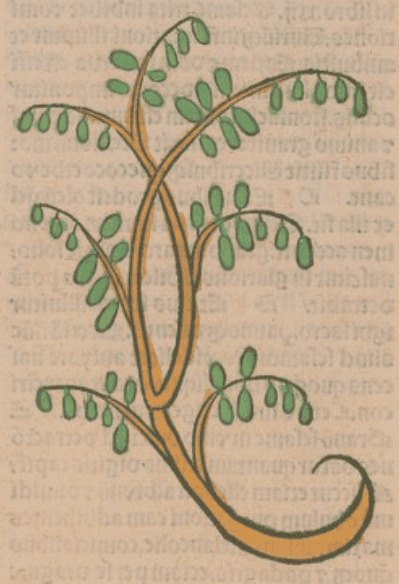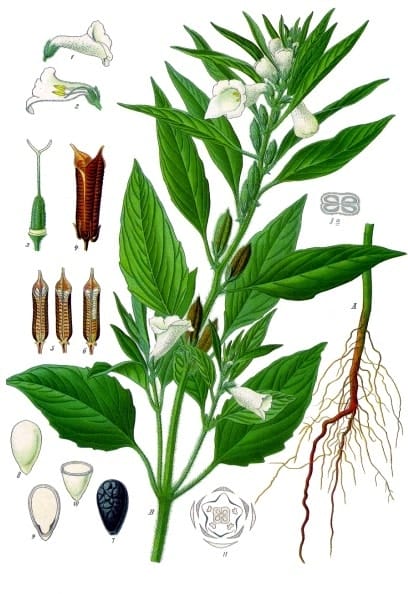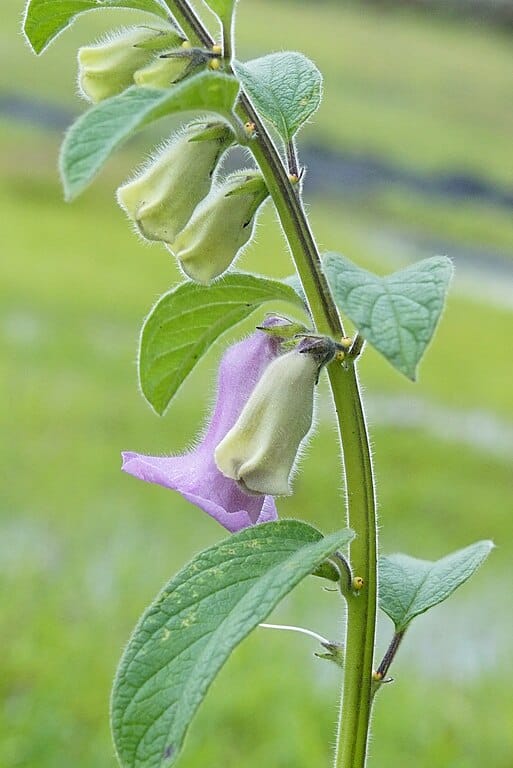Sesamum, Sesame, Hei Zhi Ma 黑芝麻Til, Tila (Ayurveda)Hei Zhi Ma (TCM) Kunjad Siyah (Unani) Til snum ཏིལ་སྣུམ་ (Tibet) |

|
 Ortus Sanitatis, Meydenbach, 1491
Ortus Sanitatis, Meydenbach, 1491 Koehler, Medizinal Pflanzen, 1897
Koehler, Medizinal Pflanzen, 1897 (Photo by Vengolis) (Wikimedia)
(Photo by Vengolis) (Wikimedia)Botanical name:
Sesamum indicum
Parts used:
Seed (Black are stronger)
Temperature & Taste:
Slightly Warm, moist. Sweet
“It is Hot in the middle and Moist in the last phase of the first degree.” (Avicenna)
Classifications:
2K. RESOLVENT. 2L. EMOLLIENT. 2P. HEMOSTATIC. 2Q. ANODYNE. 2U. SUPPURATIVE
3H. LACTAGOGUE. 3I. APHRODISIAC. 3J. INCREASE SEMEN
TCM:
N. Yin Tonic
Uses:
1. Nourishes and Tonifies the Liver and Kidneys: (West, TCM, Ayurveda, Tibet)
-weakness of the Kidney and Liver Yin (Body moisture), with failing Eyesight, blurred Vision, Tinnitus and Dizziness. (TCM)
-for old weak patients, and for those recovering from severe and chronic disease; used for Paralysis, Rheumatism (TCM)
-strengthens Bones, Teeth; beneficial in Osteoporosis and chronic lower back pain
-‘It is a remedy against … pains of the Joints… It is a remedy against Sounding and Ringing of the Ears’. (Gerard)
-good hair tonic and is used for premature Greying of the Hair;
-listed by Dioscorides for Fractures, and griefs of the Eyes.
-‘It is a fattening drug’. (Avicenna)
-‘reinforces Qi, moistens and nourishes the Five Viscera [Heart, Lungs, Liver, Spleen Kidneys]’ (Da Ming Ri Hua Ben Cao)
-‘long term use makes one Happy and vigorous and able to enjoy a long life’. (Shen Nong Ben Cao)
-‘It has the function of dispersing the old and keeping the new’. (Ben Cao Gang Mu)
2. Nourishes the Blood, Calms Wind, Stops Spasm: (West, TCM, Ayurveda, Tibet)
-Headaches, Numbness and Dizziness from Wind, deficient Blood or Yin (TCM, Tibet)
-Itching from Phlegm or Blood Humors (Avicenna)
–Gerard used it for Headaches from Heat.
-more recently recommended for Parkinson’s disease.
-Said in Ayurveda to be the best tonic and rejuvenating agent for Vata/Wind Dosas.
-‘it makes one resistant to both Cold and Hot weather’. (Da Ming Ri Hua Ben Cao)
3. Moisten the Intestines: (West, TCM, Ayurveda, Tibet)
-promotes passage of stool; used for Constipation from dryness, weakness, or deficient blood.
-Piles, including bleeding Piles in Ayurveda, for which it may be applied topically and taken internally.
4. Moves the Blood, Clears Stasis:
-Amenorrhea and Dysmenorrhea; irregular menstruation and spasmodic menstrual pain.
-“Its infusion is a potent emmenagogue and consequently it expels the Fetus”. (Ayurveda)
-‘dissolves hot swellings’ (Avicenna)
-promotes Delivery and expulsion of the placenta. (Da Ming Ri Hua Ben Cao)
5. Nourish Lung Yin, Stops Cough:
-dry Cough, Asthma, Breathlessness (Avicenna)
-Lung Yin deficiency; a good Lung tonic
6. Yogavaha:
-enhances or strengthens the other medicines it is used with. (Ayurveda)
7. Externally:
-seeds have been used both internally and externally for skin conditions including Eczema, Leprosy and Psoriasis.
-A decoction of the seeds is used as a hip-bath to promote Menstruation.
-In India, a Decoction of the leaves and roots is used as a hair wash to promote hair growth, and to blacken the hair
–Sesame oil decocted with myrtle, preserves and strengthens the hair. (Avicenna)
-Plaster for hardening of the nerves and sinews (Avicenna)
-extract of the plant is used for Dandruff (Avicenna)
Dose:
1. Seeds may be used in Decoction or Powder; the paste of the seeds (Tahini) can also be used in compounds; the Oil is much used externally in Ayurveda and is occasionally added to internal compounds.
2. “Its oil and decoction is also similar in properties”. (Avicenna)
3. ‘Stew the drug with white honey, and use to treat 100 diseases’. (Da Ming Ri Hua Ben Cao)
Decoction: 5–30 grams
Powder: 2–6 grams
Paste (Tahini): 1–2 spoonfuls
Correctives:
“When taken with honey its harmful effects are removed”. (Avicenna)
Substitutes:
1. Linseed or Hemp seed
2. For Sesame oil, oils of Olive, Almond or Linseed can usually be used.
Preparation:
1. Stir-fried or Roasted Sesame Seed:
The seeds are sometimes roasted or dry fried until browned. This makes them more warming, less moist and more grateful to the Stomach. Avicenna said Sesame ‘hampers digestion and softens the Viscera … The fried seeds are relatively less harmful”. Roasting corrects these qualities. They were used to promote Semen and Sexual Desire. (Avicenna)
2. Prepared Sesame Seed:
Sometimes Sesame seed was steeped in Child’s Urine or Alcohol, but this is rarely practiced today.
Main Combinations:
1. Tonic for the aged:
i. Black Sesame seed powder with Honey and Ghee (Ayurveda)
ii. Black Sesame powder with Poria Fu Ling and Honey.
iii. Black Sesame powder with Triphala, Withania, mixed with Honey and Ghee
iv. Black Sesame seed (50 grams), Walnuts (100 grams), form a congee with Rice.
v. Black Sesame seed with Withania, mixed with Honey to a paste, take Milk afterwards. “By observeing it for 12 days, even an old man will become young” (The Bower Manuscript, Ayurveda)
2. As a tonic, increasing strength and Intellect:
i. Black Sesame seed with Triphala, Honey and Ghee.
ii. Black Sesame seed with Triphala, Long Pepper, Black Pepper, Ginger
iii. Black Sesame seed with Calamus and Withania, mixed with Honey
3. Aphrodisiac, to strengthen the Kidney and nourish Semen:
i. Black Sesame seed with Withania and Shilajit
ii. Roasted Sesame seed, Poppy seed, Linseed (Avicenna)
iii. Black Sesame seed with Triphala, Orchid, Parsnip seed, Long Pepper, Red and White Behen (as in Triphala Electuary Greater)
iv. Black Sesame seed with Pine nut, Sweet Almond, Walnut, Pistachio, Orchis, Galangal, Sea Holly root, Asparagus root, Aniseed, White Poppy seed, Parsnip seed, Onion seed, Rocket seed, Fennel seed (as in Antidote for Cold Lumbar, for Venery, and Defect of Semen of Nicholas)
4. Infertility from Kidney deficiency:
i. Sesame seed, Shatavari, Withania
ii. Sesame seed, Withania, Shilajit, Nutmeg
iii. Sesame seed, Ginseng, Dioscorea Shan Yao
5. Strengthen the Bones and lower Back:
i. Sesame seed, Withania, Bdellium, Long Pepper (Ayurveda)
ii. Sesame seed, Asparagus root, Shailjit
6. Wounds and Fractures, steep Sesame seed in Child’s Urine four times, then steeped in distilled spirit three times; dry, and mix with Frankincense, Myrrh, and Dragon’s Blood, and form pills. (Chinese Materia Medica, Stuauoft)
7. Premature Ejaculation, use Unripe Rue, Toasted Rue, Poppy seed, Sesame seed (as in Pills of Hindi Mumsik of Unani)
8, Chronic Constipation:
i. Sesame seed oil (5 grams), Honey (15 grams). Mix well and take before breakfast.
ii. Sesame seed, Chebulic Myrobalan, Hemp seed (Ayurveda)
iii. in the aged due to dryness and deficiency, Black Sesame seed with Dang Gui, Polygonum He Shou Wu
9. Dysentery, Blood in the Stool, combine Raw Sesame seed (30 grams), toasted Sesame seed (15 grams), fried Black Fungus (15 grams). Make a powder, using 5 grams each time to make a tea. (TCM)
10. Dry Cough from Lung deficiency, Sesame seed, Sida, Inula racemosus (Ayurveda)
11. Headache Sesame oil, Madder, Rose (Avicenna)
12. Dry, itchy Skin conditions:
i. Sesame seed, Asparagus racemosus, Licorice (Ayurveda)
ii. Sesame oil, Raisin Water, Infusion of Aloe, taken internally (Avicenna)
13. To promote Milk:
i. Black Sesame seed with Fennel, Fenugreek
ii. Black Sesame seed with Red Clover, Aniseed, Fennel, Poppy seed (as in Powder for Defect of Milk)
14. As a hair tonic, boil Eclipta (Bhringaraja, Han Lian Cao) in Sesame oil and apply daily.
15. Leprosy, Roast Sesame seeds, soak in milk then beat to a paste. Mix with Licorice powder to form a poultice and apply. (The Bower Manuscript, Ayurveda)
Major Formulas:
Confection of Sesame and Triphala (Ayurveda)
Triphala Electuary Greater (Unani)
Triphera of the Saracens (Triphera Saracenica Magna)
Antidote for Cold Lumbar, for Venery, and Defect of Semen (Nicholas)
Powder of Sesame and Chebula (Ayurveda)
Powder for Defect of Milk
Pills for Premature Ejaculation (Unani)
Xiao Feng San
Cautions:
1. Not for chronic Diarrhea associated with Spleen deficiency.
2. Large doses are abortifacient
Main Preparations used:
Expressed Oil
|
‘Sesame is a plant which we find on the authority of the most ancient documents of Egyptian, Hebrew, Sanskrit, Greek, and Roman literature, has been used by mankind for the sake of its oily seeds from the earliest times. The Egyptian name Semsemt already occurring in the Papyrus Ebers, is still existing in the Coptic Semsem, the Arabic Simsim, and the modern Sesamum. The Indian languages have their own terms for it, the Hindustani Til, from the Sanskrit Tila, being one of the best known. Tila already occurs in the Vedic literature. In the days of Pliny the oil was an |
export from Sind to Europe by way of the Red Sea, precisely as the seeds are at the present day. During the middle ages the plant, then known as Suseman or Sempsen, was cultivated in Cyprus, Egypt and Sicily; the oil was an article of import from Alexandria to Venice. Joachim Camerarius gave a good figure of the plant in his “Hortus medicus et philosophicus” 1588. In modern times sesame oil gave way to that of olives, yet at present it is an article which, if not so renowned, is at least of far greater consumption’. (Pharmacographia, Fluckiger & Hanbury, 1879) |
The Chinese Classic Ben Cao Kang Mu said: ‘Taking black sesame seeds can heal all the chronic illness after 100 days, improve skin tone of body and face after 1 year, reverse gray hair after 2 years, and regrow teeth after 3 years’.
Daoists texts on Sesame (from A Soup for the Qan, Hu Sihui et al. 2010)
Food for Beneficent Immortals:
‘Sesame seeds: eaten they can eliminate all kinds of obstinate illnesses. If eaten for a long time they lengthen life, and make a person plump and strong. They lengthen the years and prevent one from getting old’.
